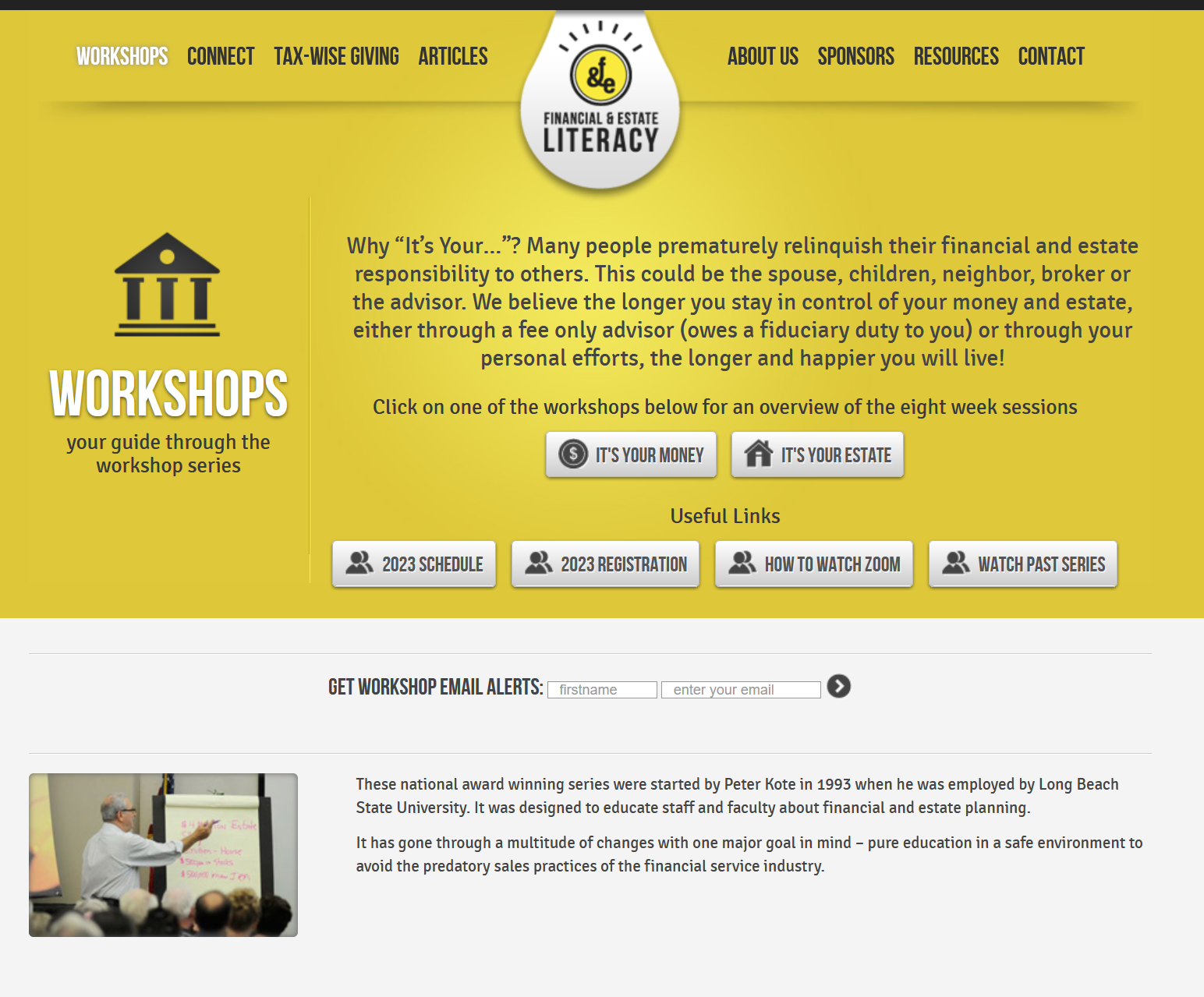In 1993, Peter Kote started a series of seminars designed to help faculty and staff at Long Beach State University become more literate about their finances.
Today, the longtime trust and estate planning professional's volunteer project has grown into a much larger educational undertaking. It's spawned a series of free public workshops that Kote estimates has attracted around 1,500 people in an average year. The seminars are offered in separate yet complementary tracks: "It's Your Money" and "It's Your Estate."
"The idea of starting the investment workshops came out of questions I kept getting from my colleagues at the time at Long Beach State, particularly about pitches from insurance companies selling variable annuities," says Kote, now chairman of Financial & Estate Literacy.
 Shortly afterwards, he incorporated Financial & Estate Literacy as a tax-exempt 501c3 nonprofit. "The purpose was to add to the creditability of these workshops and honor our pledge not let anyone use these programs to promote their own personal business," says Kote.
Shortly afterwards, he incorporated Financial & Estate Literacy as a tax-exempt 501c3 nonprofit. "The purpose was to add to the creditability of these workshops and honor our pledge not let anyone use these programs to promote their own personal business," says Kote.
The move opened the door for senior and community centers as well as libraries to provide space at no-charge. It also brought a host of different charities into the fold, including the American Heart Association, Chapman University, the Newport Beach Library Foundation, Providence Hospital and the Laguna Canyon Foundation, among others. "Without other charities to support us," says Kote, "we would not be able to provide our services free to the public."
Besides requests for more information from consumers and colleagues, the six-week "It's Your Estate" track actually traces its roots to the death of his father in the early 1990s. "It was a horrific experience," says Kote, who still tears up when recalling such dark days. "Our family really hadn't talked about death and dying and what to do to make sure people couldn't take advantage of him — both while he was sick and afterwards when we were trying to protect his estate."
After his father's death, he started taking a harder look at easily accessible and free resources for people to get their questions answered about estate planning. These are many of the same types of issues that Kote says he tackles in his "day job" as founder of Professional Fiduciary Services. As a licensed professional fiduciary, he serves as an executor, attorney-in-fact, health care agent and successor trustee.
Workshops and classes offered free to the public are too frequently fraught with conflicts of interest by those sponsoring these free-lunch and free-dinner programs, observes Kote. "It's common practice for someone putting on such a program to try to sell financial products to the attendees," he says. "It gives financial literacy programs a really bad name."
In order to protect participants in the financial literacy workshops, anybody who presents financial information must agree upfront not to take names and other contact details from those in attendance. Presenters must also promise not to initiate contact with attendees. "We give people coming to these workshops details about who is speaking, including their experience and where they work," says Kote. "If they want to get ahold of a presenter, it's their call — we make sure any follow-up is strictly under the control of the consumer, not vice versa."
Also, the program doesn't accept sponsorships from insurance companies, brokers or banks. "It's true that as a nonprofit, this policy really puts a dent into our fund raising," says Kote. "We just don't want those sort of conflicts of interest connected to our program."
Over the years, he counts 300 to 400 different presenters taking part. "We keep it diversified — the material being presented is important, so we don't want these to be forums to build a cult following or something," says Kote.
The Financial & Estate Literacy's staff also vets potential presenters by experience, education and fee structures charged by their companies. "Nobody who is licensed to sell securities or insurance is allowed," says Kote. "We only let professionals present who've demonstrated a background of working in a client's best interest, not their own."
In fact, that's a big part of the educational thrust of the nonprofit's series of workshops. "People get very confused about the differences between a broker, who is transactional-based, and a financial advisor, who must act as a fiduciary and is held to a higher standard of care," says Kote. "We find that providing consumers with a good understanding of who to deal with — and who not to — to be an important first step in helping them to take control of their own financial well-being."
Financial & Estate Literacy's workshops are offered online and in-person. Typically, each session lasts about 90 minutes and either focuses on an investment or estate management theme. (Full schedules with times, locations and detailed agendas can be found on the nonprofit's website.)
Kote stresses these workshops are intended for novices as well as more experienced consumers of financial services. "I remember once asking a woman with a $100 million estate why she was there and why she didn't just hire an attorney and financial advisor," he says. "She told me that she really didn't know who to trust and the right questions to ask. This lady was like a lot of us who are so bombarded by financial pornography and solicitations — she was feeling emotionally paralyzed to actually make any important financial and estate decisions."
Mark Hebner, Founder and CEO of Index Fund Advisors Inc., describes "It's Your Money" and "It's Your Estate" as a different sort of free educational program for consumers. He has volunteered his time teaching at workshops and sits on Financial & Estate Literacy's board of directors.
"I think investors really need an education about how markets work," says Hebner. "This program is unique because it only accepts sponsorship from nonprofits — I'm not aware of any other series of estate and investment planning workshops being offered free to the public that is set up like this one out of Orange County."
This is not to be construed as an offer, solicitation, recommendation, or endorsement of any particular security, product or service. There is no guarantee investment strategies will be successful. Investing involves risks, including possible loss of principal. IFA Index Portfolios are recommended based on time horizon and risk tolerance. Take the IFA Risk Capacity Survey (www.ifa.com/survey) to determine which portfolio captures the right mix of stock and bond funds best suited to you. For more information about Index Fund Advisors, Inc, please review our brochure at https://www.adviserinfo.sec.gov/















